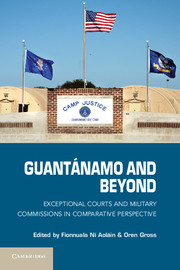Book contents
- Frontmatter
- Contents
- Contributors
- Acknowledgments
- Introduction: Guantánamo and Beyond
- Part I Military Commissions and Exceptional Courts in the United States
- 1 The Development of an Exceptional Court
- 2 Military Commissions in Historical Perspective
- 3 Contemporary Law of War and Military Commissions
- 4 Military Commissions and the Paradigm of Prevention
- 5 Prevention, Detention, and Extraordinariness
- 6 In Defense of Federal Criminal Courts for Terrorism Cases in the United States
- 7 Exceptional Courts and the Structure of American Military Justice
- 8 Exceptional Courts in Counterterrorism
- Part II Exceptional Courts and Military Commissions Elsewhere
- Part III International Law, Exceptional Courts, and Military Commissions
- Index
- References
3 - Contemporary Law of War and Military Commissions
Published online by Cambridge University Press: 05 June 2014
- Frontmatter
- Contents
- Contributors
- Acknowledgments
- Introduction: Guantánamo and Beyond
- Part I Military Commissions and Exceptional Courts in the United States
- 1 The Development of an Exceptional Court
- 2 Military Commissions in Historical Perspective
- 3 Contemporary Law of War and Military Commissions
- 4 Military Commissions and the Paradigm of Prevention
- 5 Prevention, Detention, and Extraordinariness
- 6 In Defense of Federal Criminal Courts for Terrorism Cases in the United States
- 7 Exceptional Courts and the Structure of American Military Justice
- 8 Exceptional Courts in Counterterrorism
- Part II Exceptional Courts and Military Commissions Elsewhere
- Part III International Law, Exceptional Courts, and Military Commissions
- Index
- References
Summary
TODAY, “MILITARY COMMISSION” IS A TERM OFTEN SPOKEN with derision, associated with torture and Star Chamber proceedings. It was not always so, and it need not be so today. In democratic societies, there remains a legitimate place for military commissions. As long as there are armed conflicts, there will likely be military commissions in one form or another. Their misuse, however, negates both their moral legitimacy and legal utility.
This chapter outlines the evolution of military commissions from an American disciplinary “field expedient” to meet a military necessity unaddressed by the Articles of War, to their place in contemporary law of war as a trial setting for enemies charged with violation of the laws and customs of war. Section 1 sets the stage in the U.S.-Mexican War (1846–48), and explains the genesis of military commissions. Section 2 traces their transformation from disciplinary tool to a Civil War trial forum for U.S. enemies, while section 3 reviews the military commissions that followed World War II, when they were employed by virtually every Allied country. Section 4 details post–World War II issues that had an impact on military commissions – human rights, multinational human rights treaties, and particularly, the 1949 Geneva Conventions. These interfaces changed military commissions from field tribunals with lowered procedural and evidentiary bars to trials closely reflecting U.S. courts-martial practice. Since the 9/11 attacks, many argue that commission changes implemented at Guantánamo have shifted the historical arc of their rules and procedures, making them a second-rate form of justice. This alleged progression is briefly discussed in Section 5. Section 6 looks at one of those changes – the 2006 Military Commissions Act (MCA) – the alterations it brought, and their reception in the Supreme Court of the United States. Finally, Section 7 examines a later change, the MCA of 2009.
- Type
- Chapter
- Information
- Guantánamo and BeyondExceptional Courts and Military Commissions in Comparative Perspective, pp. 73 - 94Publisher: Cambridge University PressPrint publication year: 2013

